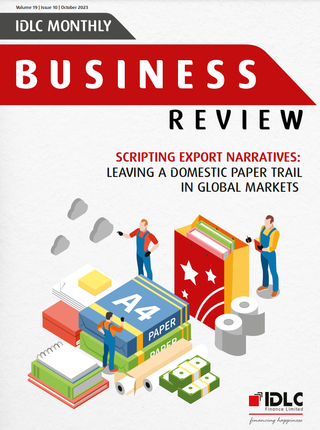
Expert Opinion on Cover Story
M. Mazedul Islam, Company Secretary, Bashundhara Paper Mills Limited
Interviewed by Syed Md. Rakeen, Team MBR
With over 13 years of experience under his belt at Bashundhara Group, one of the leading conglomerates in Bangladesh, M. Mazedul Islam is currently working as the Company Secretary at Bashundhara Paper Mills. He completed his Masters in Business Administration degree with a major in finance from American International University Bangladesh (AIUB) along with a Masters in Accounting. His extensive experience in the Department of Corporate Affairs, Financial Management, Corporate Governance Management and Issue Management had led him to become one of the most experienced heads at Bashundhara Group. Team MBR was in conversation with Mr. M. Mazedul Islam and was fortunate enough to receive his take on the prospects of paper and paper products exports.
Syed Md. Rakeen: As per the Export Promotion Bureau (EPB), paper and paper products experienced a massive 85% year- on-year increase in exports in the initial two months of the fiscal year 2023–24 relative to FY 2022-23. Which factors are playing an instrumental role in fueling the growth of exports?
Mazedul Islam: The growth of paper exports can be attributed to the quality of paper products produced by different paper mills. Back in 2016, the government offered a 10% incentive on the export proceeds of paper and paper products as well, which further strengthened the industry. Additionally, low production costs helped to scale the industry and increase the margins of the industry as well.
Syed Md. Rakeen: The strong paper export figures have often been attributed to the diversification of product categories such as writing paper, printing paper, and tissues. Would you kindly specify certain paper products that are flourishing in the markets abroad?
Mazedul Islam: Well, Bashundhara Paper Mills currently produces and exports around eight basic categories of papers and tissues with 35 grades/ items and allied products. Then again, the export options are still very limited as of now. Diversifying paper categories in the form of Wrapping Papers, Color Ledger Paper, Sticker Papers, Cigarette Tipping Papers, OGR Paper, etc., would hugely elevate the export segment of paper and paper-allied industries.
Syed Md. Rakeen: The paper and paper- allied industries bounced back remarkably from the adverse effects of COVID-19 when the shutdown of educational institutions and offices hugely reduced the usage of printing and writing papers. Would you kindly share how the industry rebounded and exceeded pre-pandemic levels of growth within a short period?
Mazedul Islam: Paper and allied products are considered essential by consumers. While it’s true that the industry faced adversities during COVID-19, its demand and daily necessities helped it rebound. Bashundhara Paper Mills, as an organisation, ensured cost control in production and introduced some supplementary products like food wrapping, paper, and tissue-based cover/sheets, considering health and hygiene. After COVID-19, these aforementioned products showed noticeable demand.
Syed Md. Rakeen: Globally, several paper mills have been closed recently, including close to 1200 mills in China, due to environmental and pollution concerns. How is Bangladesh addressing environmental sustainability issues amidst the growing exports of paper and paper products?
Mazedul Islam: Bangladesh is a contributory partner to the Sustainable Development Goals of the United Nations (UN). There is no denying that the paper manufacturing process does have a negative impact on the environment. Against this backdrop, the paper mills of Bangladesh have taken many steps to address environmental concerns, such as ESG implementation, ETP plants for water, solar plants, plantations, and other initiatives for improved energy, water efficacy, and emission control.
Syed Md. Rakeen: Exporters are generally required to conduct thorough quality and compliance procedures for their goods. How do the paper manufacturers ensure that exported paper products meet international quality standards?
Mazedul Islam: To meet international quality standards, Paper manufacturers ensure that exported paper products meet certain protocols, including Quality control, Testing and Certification, etc. Among the certifications, the most basic certificates for quality testing are FSC-COC certification, ISO 9001: 2015 and ISO 14001:2015. Apart from these protocols mentioned above, the paper manufacturers also work closely with their importers to ensure that their products meet their specific requirements. This may involve developing custom paper products or modifying existing products to meet the importers’ needs.
Syed Md. Rakeen: About 90% of the pulp used in manufacturing papers is imported and is scarcely available at times, leading to an increase in the price of paper. How can Bangladesh reduce its reliance on pulp imports and promote local production of paper to cater to domestic and foreign demands?
Mazedul Islam: It’s true that, at this stage, Bangladesh isn’t in a position to produce virgin pulps. As there’s a lack of availability of pulp, the government can reduce the duty of imports of these raw materials. However, considering the long- term potentiality of the industry, Bangladesh can reduce its reliance on pulp imports by promoting the use of non-wood pulp sources. Bangladesh has a large amount of agricultural waste, such as rice straw, jute sticks, and bagasse, which can be used to produce pulp. The government can provide incentives to companies that invest in non-wood pulp production technologies.
Syed Md. Rakeen: The gradual shift of China and India from paper exports to hi-tech industries has opened up opportunities for Bangladesh to ramp up its paper export segments. How can Bangladesh capitalise on this opportunity and increase its competitiveness in the global market?
Mazedul Islam: Bangladesh should look to improvise the machines and equipment of its factories as well. China and India are among the core raw material suppliers of Bangladesh; hence the exemption of import duty and income tax can play a vital role in increasing the competitiveness of paper exports.
Syed Md. Rakeen: The Export Promotion Bureau data displayed that the paper and paper-allied industries registered an incredible USD 313.2 million in exports during the fiscal year 2022–23, relative to USD 169.81 million during the fiscal year 2021–22. Given the industries’ exponential rise in recent years, how do you envision the future of paper and paper-allied industries in both domestic and foreign markets?
Mazedul Islam: Due to the concept of a paperless economy and digitalisation, the demand for writing papers is decreasing day by day. However, if we look at the change in demand of consumers for paper-allied products, the demand is continuously going up every day. For this consideration, paper products can be used as alternatives to plastic goods. In the future, paper and paper-based products will take over plastic goods.

Scripting Export Narratives: Leaving A Domestic Paper Trail In Global Markets
Bangladesh is currently in a precarious position due to rising import prices and dwindling foreign currency reserves. Amidst the uncertainties, the paper and paper products industry has emerged as a key source of foreign earnings in recent years, with the sector recording an 85% year-on- year growth during July-August of FY 2023- 24 relative to FY 2022-23.
The market size of paper and paper-allied products is estimated to be BDT 5,000 crore, with the industry comprising diverse paper products, including writing and printing papers, offset papers, newsprints, tissues, and packaging papers. The industry was largely boosted back in 2016, owing to the government’s cash incentive of 10% on receipts. Till now, Bangladesh has been exporting its paper-allied products to over 50 nations, including the United States and countries from Europe, the Middle East, and Africa.
As the world edges closer towards a paperless economy, the demand for writing and printing paper is expected to experience a sharp downfall, while the heavy reliance on paper pulp imports and its scarcity will trigger an increase in the prices of paper products. However, these challenges have been addressed adequately, as paper mills have invested in waste paper processing to reduce reliance on imported raw materials while prioritising product diversification to cater to foreign demands. An excellent opportunity awaits Bangladesh, as the decreased paper manufacturing of China, India and Japan can propel the paper industry to new heights and establish itself as one of the paper manufacturing hubs in the world.
Md. Shah Jalal
Editor
IDLC Monthly Business Review
Download View